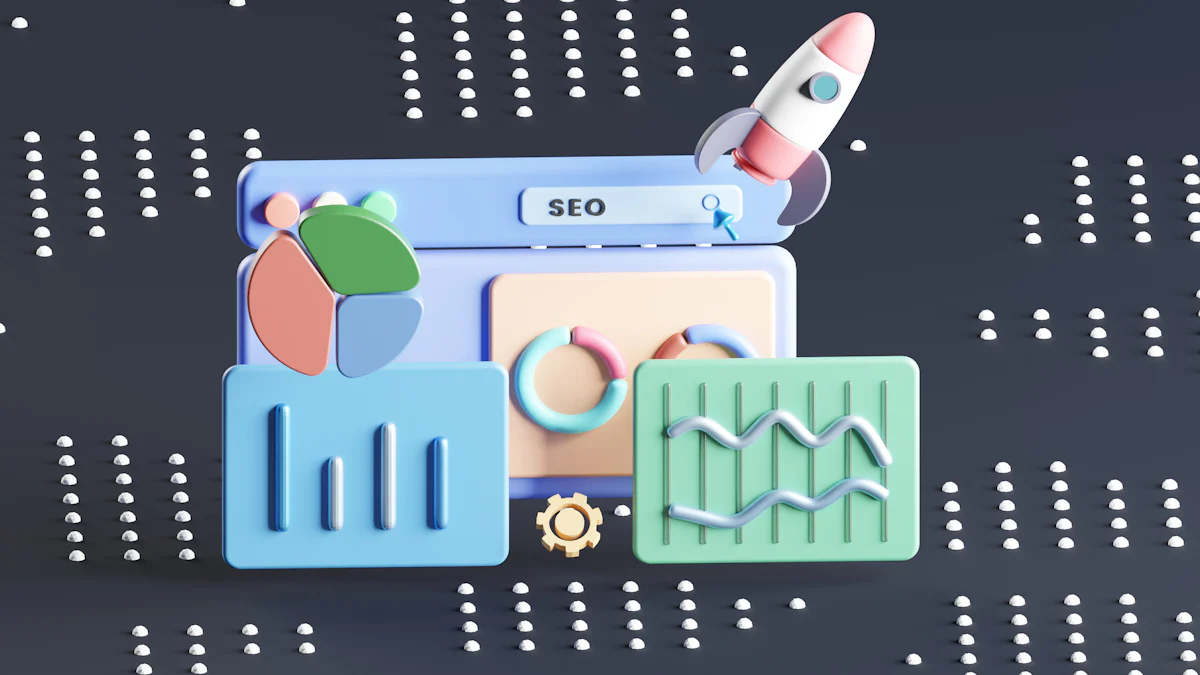AI and SEO: How to Generate Optimized Content

In today's digital landscape, SEO plays a crucial role in marketing success. With 90% of organizations planning to prioritize SEO, its importance cannot be overstated. You might wonder how AI is transforming these practices. AI and SEO together revolutionize how content gets optimized. AI tools analyze data swiftly, helping you identify trends and optimize content effectively. This transformation allows you to stay ahead in the competitive digital space. As consumers increasingly rely on search engines, leveraging AI-driven content optimization becomes essential for achieving higher visibility and engagement.
Understanding AI in SEO
What is AI in SEO?
Definition and scope
AI in SEO refers to the use of artificial intelligence technologies to enhance search engine optimization practices. You can think of it as a smart assistant that helps you optimize your content for search engines. AI analyzes vast amounts of data quickly, identifying patterns and trends that would take humans much longer to discern. This capability allows you to make informed decisions about your SEO strategies.
Key technologies involved
Several key technologies power AI in SEO. Machine learning algorithms play a crucial role by learning from data and improving over time. Natural language processing (NLP) helps AI understand and generate human language, which is essential for content creation and optimization. Predictive analytics uses AI to forecast future trends and user behavior, enabling you to stay ahead in the SEO game. These technologies work together to provide actionable insights and suggest content improvements.
Benefits of AI in SEO
Enhanced data analysis
AI significantly enhances data analysis capabilities. It processes large datasets swiftly, uncovering valuable insights that can inform your SEO strategies. For instance, AI can automate keyword research, identifying the most relevant keywords for your content. This automation saves you time and ensures that your content aligns with current search trends. According to a study published in Forbes, AI can also improve predictive SEO, helping you anticipate future trends and user behavior.
Improved content personalization
AI excels in content personalization, tailoring content to meet the specific needs and preferences of your audience. By analyzing user data, AI can suggest personalized content recommendations, enhancing user engagement and satisfaction. This level of personalization gives you a competitive advantage in the digital marketing landscape. AI tools also keep up with evolving search engine algorithms, ensuring that your content remains relevant and optimized.
AI Tools for Content Generation

In the realm of AI and SEO, various tools have emerged to streamline content creation. These tools not only enhance efficiency but also ensure that your content aligns with SEO best practices.
Popular AI Content Tools
Features and functionalities
Several AI tools stand out for their unique features and functionalities. SEO.ai is renowned for its ability to expedite content creation. It boasts a built-in semantic keyword tool and an SEO quality score function, which help you maintain high-quality SEO standards. Copy.ai offers a library of workflows that require minimal human input. This tool generates copy, outlines, and ideas, making the content creation process seamless. Another noteworthy tool is BrightEdge’s Content Advisor with Copilot and Autopilot. This suite integrates various AI applications to create a unified SEO workflow, ensuring that every piece of content is crafted with SEO excellence.
Use cases and examples
These AI tools have diverse applications. For instance, SEO.ai can help you produce content five times faster, making it ideal for businesses needing rapid content updates. Copy.ai is perfect for generating creative content ideas, which can be particularly useful for marketing campaigns. BrightEdge’s suite supports continuous, automated optimization, allowing businesses to maintain a competitive edge by leveraging AI-driven insights for both content creation and performance monitoring.
Choosing the Right AI Tool
Factors to consider
When selecting an AI tool for content generation, consider several factors. First, evaluate the tool's ease of use. A user-friendly interface can significantly reduce the learning curve. Next, assess the tool's integration capabilities with your existing systems. Compatibility ensures a smooth workflow. Additionally, consider the tool's ability to provide actionable insights. This feature is crucial for making informed decisions about your content strategy.
Comparing different tools
Comparing different AI tools involves examining their strengths and weaknesses. SEO.ai excels in speed and quality assurance, making it suitable for fast-paced environments. Copy.ai offers versatility with its extensive library of workflows, catering to various content needs. Meanwhile, BrightEdge’s suite provides a comprehensive solution for businesses seeking a holistic approach to SEO and content management. By weighing these factors, you can choose the tool that best aligns with your specific requirements and goals.
Creating SEO-Optimized Content with AI
Keyword Research and Analysis
AI-driven keyword tools
AI tools have revolutionized keyword research, making it more efficient and insightful. These tools analyze vast amounts of data to uncover semantic relationships between keywords. This understanding helps you identify search trends and predict user behavior. For instance, BrightEdge's AI tool, Instant, generates 100 times more keywords from a seed list. It benchmarks these keywords across different countries, providing a comprehensive view of keyword performance. By using AI-driven tools, you can streamline your keyword research process and ensure your content aligns with current search trends.
Identifying high-value keywords
Identifying high-value keywords is crucial for effective SEO. AI tools like Concured utilize advanced algorithms to pinpoint relevant topics and keywords for targeting. These tools analyze search data to determine which keywords offer the most potential for driving traffic and engagement. By focusing on high-value keywords, you can enhance your content's visibility and relevance. This approach not only improves your search engine rankings but also increases user engagement and conversion rates.
Content Structuring and Formatting
AI suggestions for structure
AI provides valuable suggestions for structuring your content. It analyzes successful content patterns and recommends optimal structures for your articles. This guidance helps you organize your content logically, making it easier for readers to follow. AI tools also suggest headings and subheadings that improve readability and SEO performance. By following AI-generated structure recommendations, you can create content that resonates with both users and search engines.
Enhancing readability and engagement
Enhancing readability and engagement is essential for effective content. AI tools offer insights into improving these aspects by analyzing user behavior and preferences. They suggest ways to simplify language, shorten sentences, and use bullet points or lists for clarity. AI also helps you tailor content to your audience's needs, increasing engagement and satisfaction. By leveraging AI insights, you can create content that captivates your audience and encourages them to interact with your brand.
AI in Content Personalization
Understanding User Intent
AI techniques for intent analysis
Understanding user intent is crucial for creating content that resonates with your audience. AI techniques play a pivotal role in analyzing this intent. By examining search queries and user behavior, AI can discern what users are truly seeking. This analysis goes beyond simple keyword matching. It delves into the nuances of user queries, helping you tailor your content to meet specific needs. As experts note, AI's ability to cluster keywords and identify subtle differences ensures your content captivates and engages your target audience.
Tailoring content to user needs
Once AI identifies user intent, you can tailor your content accordingly. This personalization enhances user experience, a critical factor in SEO success. AI tools suggest personalized content recommendations based on user data, ensuring your content aligns with audience preferences. As Penny Warnock, a brand content specialist, emphasizes, maintaining authenticity through personalized, human-centric content is essential. By leveraging AI, you can create content that not only meets user needs but also builds trust and engagement.
Dynamic Content Adaptation
Real-time content adjustments
AI enables real-time content adjustments, allowing you to respond swiftly to changing user behaviors and preferences. This dynamic adaptation ensures your content remains relevant and engaging. AI tools monitor user interactions and suggest modifications to enhance content performance. For instance, if a particular section of your website receives less engagement, AI can recommend changes to improve its appeal. This proactive approach keeps your content fresh and aligned with user expectations.
Personalization strategies
Implementing effective personalization strategies involves using AI insights to customize content for individual users. AI analyzes user data to identify patterns and preferences, enabling you to deliver tailored experiences. These strategies might include personalized recommendations, dynamic content displays, or targeted messaging. By adopting these approaches, you can enhance user satisfaction and foster stronger connections with your audience. As various experts highlight, AI's role in content personalization is invaluable for achieving SEO success and maintaining a competitive edge.
Measuring the Impact of AI-Optimized Content

Key Performance Indicators (KPIs)
Metrics to track
To gauge the success of your AI-optimized content, you need to focus on specific Key Performance Indicators (KPIs). These metrics provide valuable insights into how well your content performs. Start by tracking page views, which indicate the number of times users visit your content. Monitor the average time spent on a page to understand user engagement levels. A longer duration suggests that your content captivates the audience. Additionally, observe the bounce rate, which reflects the percentage of visitors who leave after viewing only one page. A lower bounce rate often signifies that your content meets user expectations.
Survey Results: According to a survey, 84% of bloggers reported that AI and automation have significantly impacted their SEO strategy for 2023. This highlights the importance of integrating AI tools to enhance content performance.
Analyzing content performance
Analyzing content performance involves examining these KPIs to identify areas for improvement. Use tools like Google Analytics to gather data and generate reports. Look for patterns and trends in user behavior. For instance, if a particular piece of content consistently receives high traffic, analyze what makes it successful. Conversely, if some content underperforms, investigate potential reasons. This analysis helps you refine your content strategy and optimize future content for better results.
Continuous Improvement with AI
Iterative content optimization
Continuous improvement is essential for maintaining the effectiveness of your AI-optimized content. Iterative content optimization involves making small, incremental changes based on performance data. Regularly update your content to reflect current trends and user preferences. This approach ensures that your content remains relevant and engaging. By embracing a cycle of testing, analyzing, and refining, you can enhance your content's impact over time.
Key Insight: 58% of SEO professionals plan to integrate generative AI functionality into their workflows within the next year. This trend underscores the growing reliance on AI for continuous content improvement.
Leveraging AI insights
AI provides valuable insights that can drive your content strategy forward. Use AI tools to analyze user data and identify emerging trends. These insights help you anticipate changes in user behavior and adjust your content accordingly. AI can also suggest new content ideas based on user interests and search patterns. By leveraging these insights, you can create content that resonates with your audience and maintains a competitive edge in the digital landscape.
Challenges and Considerations
Ethical Concerns in AI Content Creation
Bias and fairness
When you use AI for content creation, you must consider the potential for bias. AI systems learn from existing data, which may contain biases. This can lead to content that unintentionally reflects these biases. Ensuring fairness in AI-generated content requires vigilance. Regularly review and refine AI outputs to maintain a balanced perspective. By doing so, you ensure that your content remains inclusive and fair to all audiences.
Transparency and accountability
Transparency is crucial when using AI in content creation. You should clearly communicate when AI tools contribute to your content. This transparency builds trust with your audience. Accountability also plays a vital role. You must take responsibility for the content produced by AI, ensuring it aligns with your brand's values and voice. By maintaining transparency and accountability, you foster a trustworthy relationship with your readers.
Technical Challenges
Integration with existing systems
Integrating AI tools with your current systems can pose challenges. Compatibility issues may arise, affecting workflow efficiency. To overcome this, you should evaluate AI tools for seamless integration before implementation. Choose tools that align with your existing infrastructure. This careful selection ensures a smooth transition and maximizes the benefits of AI in your content strategy.
Data privacy and security
Data privacy and security are paramount when using AI. You must protect user data from unauthorized access and breaches. Implement robust security measures to safeguard sensitive information. Additionally, comply with data protection regulations to maintain user trust. By prioritizing data privacy and security, you ensure that your AI-driven content strategy remains ethical and secure.
Future Trends in AI and SEO
Emerging Technologies
AI advancements in SEO
AI continues to revolutionize SEO by offering innovative solutions. You can now analyze data with precision, providing actionable insights that improve website ranking. AI tools go beyond traditional SEO tactics. They analyze large amounts of data, suggest content improvements, and keep up with evolving search engine algorithms. This transformation allows you to optimize your content more effectively, ensuring it aligns with current trends and user expectations.
Predictive analytics and forecasting
Predictive analytics plays a crucial role in the future of SEO. By using AI, you can forecast trends and user behavior. This foresight helps you stay ahead of the competition. AI tools analyze historical data to predict future search patterns. This capability enables you to tailor your content strategy to meet anticipated demands. As a result, you can enhance your website's visibility and engagement, ensuring long-term success in the digital landscape.
The Evolving Role of AI in Digital Marketing
AI's impact on marketing strategies
AI significantly impacts marketing strategies by providing deeper insights into consumer behavior. You can use AI to analyze customer data, identifying patterns and preferences. This analysis allows you to create personalized marketing campaigns that resonate with your audience. AI also automates repetitive tasks, freeing up time for you to focus on strategic planning. By integrating AI into your marketing efforts, you can enhance efficiency and effectiveness, driving better results.
Future opportunities and challenges
The future of AI in digital marketing presents both opportunities and challenges. On one hand, AI offers the potential for greater personalization and improved customer experiences. You can leverage AI to deliver targeted content and recommendations, increasing engagement and conversion rates. On the other hand, challenges such as data privacy and ethical considerations must be addressed. Ensuring transparency and accountability in AI-driven marketing is essential. By navigating these challenges, you can harness the full potential of AI, maintaining a competitive edge in the ever-evolving digital landscape.
AI and SEO together create a powerful synergy that transforms how you approach digital marketing. By embracing AI tools, you can enhance your website's organic performance and gain a competitive edge. These tools streamline keyword research, optimize content, and personalize user experiences. As AI continues to evolve, it promises a future where SEO becomes more accurate and efficient. You should seize this opportunity to integrate AI into your strategies, ensuring your content remains relevant and impactful in the ever-changing digital landscape.
See Also
Harnessing AI to Enhance Content Marketing Strategies
The Power of AI in Crafting Compelling Sales Content
Is Labeling AI-Created Content Necessary?
